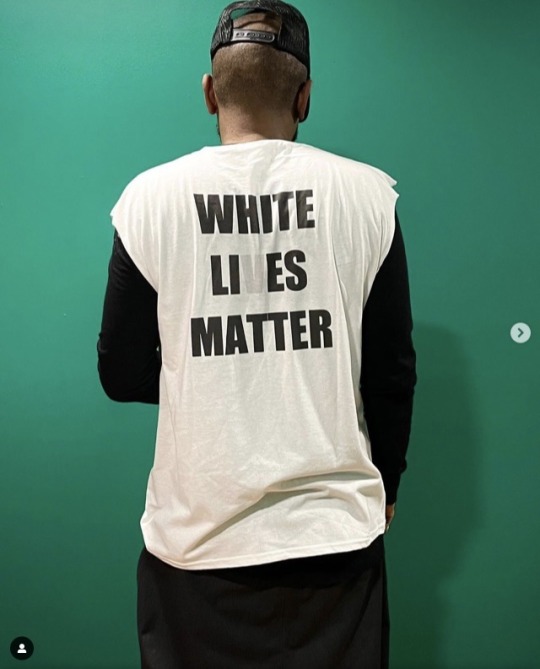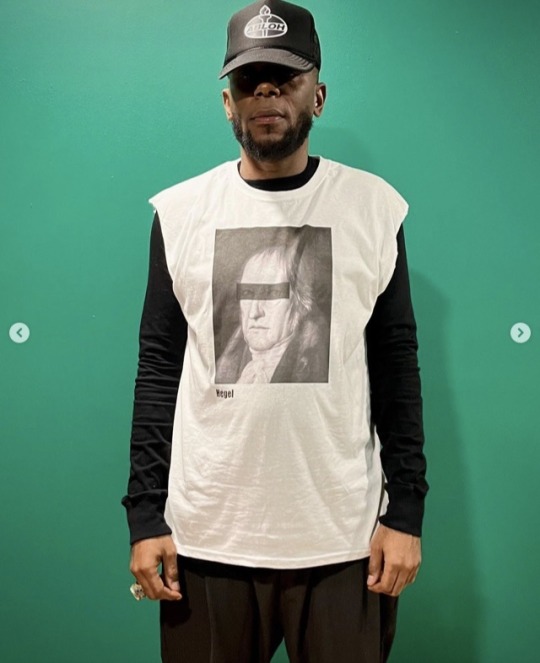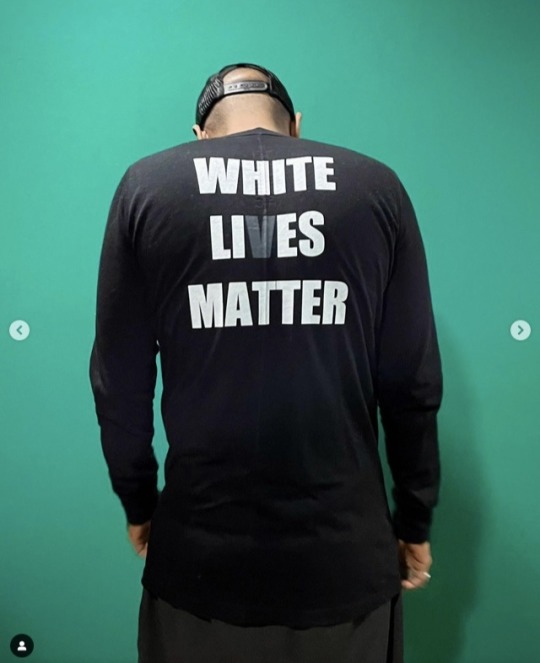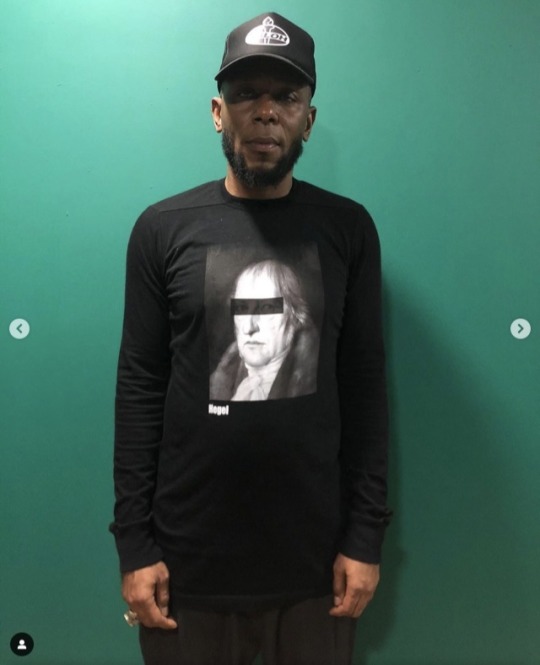#White lies matter
Text
Did Slavery Affect Your Family? Africans vs African Americans
youtube
this is a very interesting conversation and if you really want to get to the bottom you should watch this all the way through because in the end you will probably be surprised
6 notes
·
View notes
Text


5 notes
·
View notes
Text
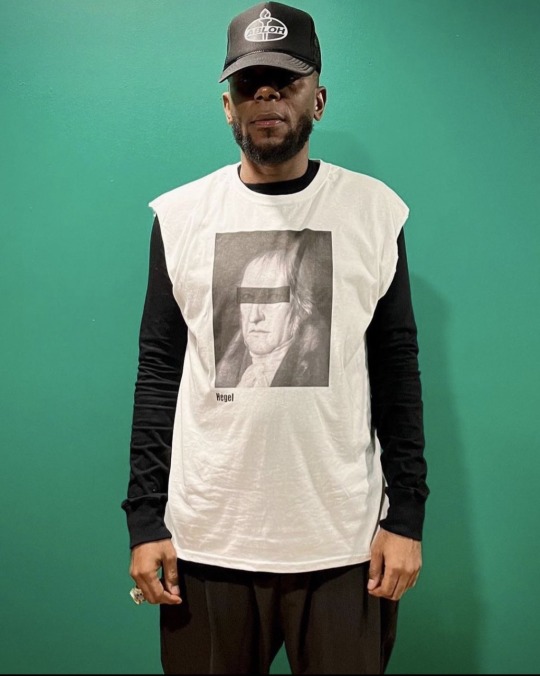
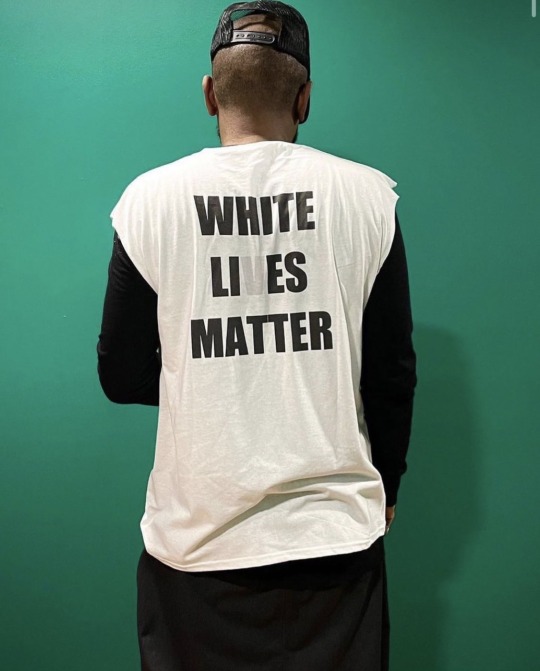
yasiin bey, formerly known as mos def, wears “white lies matter” shirt to combat kanye
5 notes
·
View notes
Text


Custom White Lie Party Shirt, Personalized White Lies College Party T-Shirt, Funny White Lies Shirts | Shop on Etsy
#white lies#white lie party#graphictees#graphictshirts#tshirt#shirt#graphic tees#graphic tshirt#vintage shirt#retro shirt#retro aesthetic#college party#white lies matter
0 notes
Text
The Polin fandom (over)reaction and discussion around the Marina plot always blows me away because people are so over the top about it. Like, I also didn’t love it, but I sense for incredibly different reasons.
For me, the issue is more that it doesn’t treat Colin as his own character and rather just as the plot device that exists to develop Marina and mostly Pen. Colin gets basically zero POV and *that* bugs me. It could be a great story for his development but he’s essentially forgotten. He’s betrayed by the first woman he believes himself in love with and is exposed to that truth along with everyone else in highly public and humiliating fashion. That would rattle a person’s confidence in their ability to trust their own instincts to the core! And now it’s going to happen again! He’s going to fall in love with someone who is keeping a massive and potentially life-altering secret from him. How would he not see and have to grapple with that parallel? But none of that matters to the majority of the Polin fandom.
For a lot of people, it seems to be more about the fact that Colin is supposed to “belong” to Pen and him having any interest in someone else makes him lesser. Him and how he was impacted matters way less than that it made Pen sad to watch it.
Hence why so many want Colin to have to “watch Pen with someone else like she had to do” Which completely ignores the actual story that played out with Marina and how, while I understand and empathize with her, she was not an actual LI for him?
Side note: That also kind of reflects in how the fandom casts Marina so often as the villain/punching bag but rarely is that focus on her impact on Colin. It’s almost always about Pen and how *she* felt. People care more about one unkind moment, done out of fear and desperation, of Marina towards Pen than they do about the totality of Colin.
I also think, and this is the most controversial part, that people do know deep down that how Pen handled things with LW wasn’t great but, despite complaining that no one accepts her complexity, they don’t want to grapple with her choices or actually allow her that complexity. Hence, Marina bad but also somehow Colin bad so they must suffer for causing Pen pain (however indirectly) while we must brush past the impact that LW and Pen’s choices had on Marina and will continue to have on Colin. It’s also why Colin’s pain and how he was impacted only really seems to come up when people want to make Marina look like a villain so they can argue that Pen did nothing wrong. All initial discussions about the Marina storyline centre Pen and how it made her feel.
It’s why, again, people are so ready for Colin to “suffer” and uplifting some random plot device character (I have not and will not bother to learn his name.) Because, at the end of the day, even though the person actually most hurt and impacted by Marina *and* Penelope’s choices was Colin, he committed the ultimate sin of liking someone before Pen and that matters more to most of this fandom. Because, if most of us are truly honest, Colin doesn’t matter to this fandom other than as an extension of Pen. He is her prize and not his own worthy of development and complexity character.
P. S. If you don’t believe me, spend 2 minutes perusing the Ao3 page for Polin. How many stories are about Colin truly grappling with everything vs him being ‘punished’? And how often does that ‘punishment’ feature Marina cheating on/mistreating/abusing him but still focus mostly on Pen? Spoiler: it’s a huge chunk.
#polin#bridgerton#Colin does not matter to this fandom#and I will never stop banging on about that#because I am sick of being lied to#also#I see you#I see you Polin fandom#your exultion of the white guy Plot Device#vs the desperate and scared Black teenage girl#not the point of this post#but it always bugs me#Colin Bridgerton is his own character#and his pain and complexity deserve better
35 notes
·
View notes
Text
Li Bing has his own way to deal with his emotions and the daily issues. Since he was a child, he has always done one thing to not be overwhelmed by his thoughts and that is busying himself with reading and studying. In this way, he didn't think about his condintion, about his sickness, about his life that wouldn't be long. He does the same as an adult, he buries himself into work and solving cases.
So, what makes you think that the Vice-Minister didn't pay a visit to his most important person? What makes you think that he wasn't touched by what happened to the General when he saved him and ended up in a coma?

This fic answers to those questions because, unlike someone has thought, Li Bing wasn't indifferent, he wasn't at all.
#Third fic of the year#I set a goal to post a fic at least once a month#I was supposed to post it before the end of March but I couldn't#However it doesn't matter#What matters is the I LOVED White Cat Legend#I LOVED LI BING AND QIU QING ZHI#Those two were so Danmei coded like Li Xiangyi and Di Feisheng#they are so cute#I also loved Yi Zhi Hua#That little red psychotic cat#He was sent to die but survived#I felt really sorry for him when his mother casted him away#Anyway new obsession unlocked#cdrama#chinese drama#white cat legend#miles wei#ding yuxi#wei zheming#li bing#qiu qingzhi#I hope to be able to write and post more fic more often in the future
14 notes
·
View notes
Text
feeling so normal about li bing and qiu qingzhi btw
#their dynamic is fascinating no matter which medium you choose#but the cdrama's choice to deep dive on the 'old friend' deal and all that entails just hit my specific niche so hard#idk what it's like to experience the cdrama when you haven't got the donghua in the back of your head but as someone who did?#the irony was so much. despite the changes enough was kept intact that going in I knew two things for sure:#1) despite seeming antagonism they do both care for each other. 2) qqz was never getting out alive.#was sad to see the li bing|li bao stuff get dropped but the new backstory worked + explained the differing characterisation for lb rly well#white cat legend#white cat legend spoilers#<- for my own tags oops#no but like. the way that lb admitted he always thought he'd die young but maybe he could live on through qqz#and then in the end it's lb left alone with no choice to die even if he wanted to. whilst qqz would rather die than become a 'monster'.#and he meant it in a different way (addiction metaphor) but lb had his own worries that his demon state meant he was now a monster.#sth sth choices about living and dying and being a 'monster' and how lb had support but qqz was surrounded on all sides by wolves#he chose to be there because he had to be to survive. as a former slave he knew he had limited choices. but it's still so....
8 notes
·
View notes
Text
.
#it actually makes me sick like physically ill how much praise is heaped onto goyishe american leftists#people who could not point to gaza on a map six months ago. whose knowledge of middle east history comes from outdated textbooks and twitte#for being anti imperial activists and well educated anti imperialists with all the right buzzwords and all the right opinions#meanwhile nothing i say will ever be good enough bc i'm jewish and palestinians are tokenized by people who care more about appearing#like someone who Listens to Palestinians as opposed to 1) doing anything material to help them (like donating money)#and 2) not spreading obvious misinformation. something that does material damage to the cause of liberation#AND further fuels the most insidious of zionist propaganda which relies on the antisemitism of ignorant western goys#this propaganda banks on their antisemitism bc it's that fucking reliable#every white western goy that harasses jews or spreads misinfo about jews or is straight up just racist towards random israeli immigrants#ppl living in the west like running coffee shops that are now having their windows smashed bc that what? supports palestinian liberation?#makes it that much easier for actual zionist propagandists to say 'see. this was never about imperialism. they want an excuse to harm you.'#'you are only safe with us'#i grew up in a cauldron of this kind of propaganda and i was playing on hard mode i got it from the orthodox#it took years of dutiful unlearning. of wrestling with some really difficult realities. of realizing that i'd been not only lied to#but information had been deliberately kept from me to keep me from knowing the true depths of the horror happening in gaza#i did not get the luxury of starting to care about this six months ago during a concerted effort to correct the record#i had to put in the effort to unlearn two decades of propaganda given to me so young i don't remember a time when i didn't know it#and i am by far not the only jew with this experience#i have put in way more effort to care about this than every white western goy with a megaphone posting palestinian flags on IG#but none of that matters bc i am a jew and for the last 5000+ years we don't get to decide how we're discussed or how we're remembered#never mind how many jewish voices (and yes! even israeli voices!) have been supporting liberation efforts in palestine for years.#who've done an amazing job reaching more people who need help seeing through the propaganda they were raised on#i can only be a token who speaks only in protest chants or i can be an evil zionist. the anti imperial work doesn't matter.#bc anti imperial work is hard and none of them actually want to do it they just want the protest photos#anyway this is why i don't discuss this on the piss on the poor website. tbh i don't trust y'all
16 notes
·
View notes
Text
wowwww, wonder how the pope feels being on this racist teeshirt ?

#kanye#pope john paul#white lies matter#white lives matter teeshirt#yeezie crap#fashion trash#white lies#white supremacy#white supremacy gear
0 notes
Text
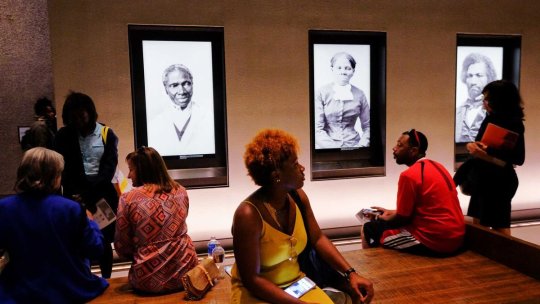
The portraits of Sojourner Truth, Harriet Tubman, and Frederick Douglass hang on the walls of the Smithsonian Institution’s National Museum of African American History and Culture on September 24, 2016, in Washington, DC
In August 1619, the first ship with “20 and odd” enslaved Africans arrived on the shores of Virginia. Four hundred years later, we look back at this moment as the start of an enduring relationship between the founding of the United States and the unconscionable exploitation of the enslaved.
In a sweeping project published by the New York Times Magazine in August 2019 exploring the legacy of slavery, Nikole Hannah-Jones wrote, “[The enslaved] and their descendants transformed the lands to which they’d been brought into some of the most successful colonies in the British Empire. ... But it would be historically inaccurate to reduce the contributions of black people to the vast material wealth created by our bondage. Black Americans have also been, and continue to be, foundational to the idea of American freedom.”
Yet centuries later, the lasting impact of slavery continues to be minimized and myths continue to flourish. For instance, there’s the erasure of the many slave revolts and rebellions that happened throughout the nation, perpetuating the lie that the enslaved were docile or satisfied with their conditions. There’s also the persistent idea that black labor exploitation is over, when mass incarceration still keeps millions of black Americans behind bars and often working for “wages” that amount to less than $1 an hour. Then there’s the idea that our understanding of slavery is accurate based on what we learned in history textbooks, when in reality, misinformation continues to be taught in our public schools about slavery’s legacy.
To unpack what often gets mistold or misunderstood, we asked five historians to debunk the biggest myths about slavery. Here’s what they said, in their own words.
1) The myth that slaves never rebelled
Miseducation surrounding slavery in the US has led to an elaborate mythology of half truths and missing information. One key piece of missing history concerns slave revolts: Few history books or popular media portrayals of the trans-Atlantic slave trade discuss the many slave rebellions that occurred throughout America’s early history.
C.L.R. James’s A History of Pan African Revolt describes many small rebellions such as the Stono Plantation insurgence of September 1739 in the South Carolina colony, where a small group of enslaved Africans first killed two guards. Others joined them as they moved to nearby plantations, setting them afire and killing about two dozen enslavers, especially violent overseers. Nat Turner’s August 1831 uprising in Southampton, Virginia, where some 55 to 65 enslavers were killed and their plantations burned, serves as another example.

A country road follows the trail of Nat Turner’s 1831 slave rebellion in rural southeastern Virginia, June 5, 2010. On either side, farms were burned and slavers murdered as Nat Turner and his followers marched toward the town of Jerusalem, now renamed Courtland. Andrew Lichtenstein/Corbis via Getty Images
Enslaved Africans resisted and rebelled against individual slave holders and the system of slavery as a whole. Some slipped away secretly to learn to read. Many simply escaped. Others joined the abolitionist movements, wrote books, and gave lectures to the public about their experiences in captivity. And others led or participated in open combat against their captors.
Omitting or minimizing these stories of rebellion helps hide the violent and traumatic experiences enslaved Africans endured at the hands of enslavers, which prompted such revolts. If we are unaware of resistance, it is easier for us to believe the enslaved were happy, docile, or that their conditions were not inhumane. It then becomes easier to dismiss economic and epigenetic legacies of the transatlantic slave system.
Dale Allender is an associate professor at California State University, Sacramento.
2) The myth that house slaves had it better than field slaves
While physical labor in the fields was excruciating for the enslaved — clearing land, planting, and harvesting that often destroyed their bodies — that didn’t negate the physical and emotional violence enslaved women, and sometimes men and children, suffered at the hands of enslavers in their homes.
In fact, rape of black women by white enslavers was so prevalent that a 2016 study revealed 16.7 percent of African Americans’ ancestors can be traced back to Europe. One of the study’s authors concludes that the first African Americans to leave the South were those genetically related to the men who raped their mothers, grandmothers, and/or great-grandmothers. These were the enslaved African Americans within the closest proximity to and who spent the longest durations with white men: the ones who toiled in the houses of slave owners.
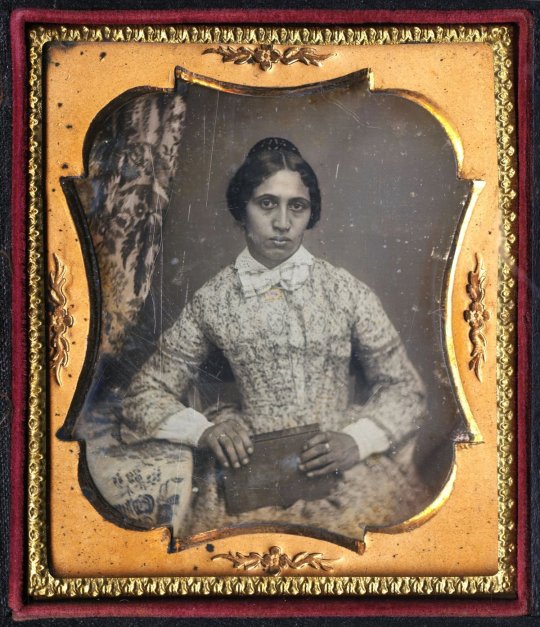
An unidentified woman poses with a book in her hands, circa 1850. The original caption identifies her only as a “freed slave.” Transcendental Graphics/Getty Images
A 2015 study determined that 50 percent of rape survivors develop PTSD. It is hard to imagine that enslaved and freedom-seeking African American survivors of rape — female, male, old, young, no matter their physical or mental abilities — did not experience further anxiety, fear, and shame associated with a condition they could not control in a situation out of control. Those African Americans with the most European ancestry, those tormented mentally, physically, emotionally, and genetically in the house, knew they had to get out. In fact, they fled the farthest — Southern whites are more closely related to blacks now living in the North than the South.
Jason Allen is a public historian and dialogue facilitator working at nonprofits, hospitals, and businesses in New York, New Jersey, and Philadelphia.
3) The myth that abolition was the end of racism
A common myth about American slavery is that when it ended, white supremacy or racism in America also ended.
Recently, Senate Majority Leader Mitch McConnell offered a familiar variant of this myth when he said he opposed reparations “for something that happened 150 years ago.” To the Kentucky Republican, a descendant of enslavers, slavery simply was, and then it just wasn’t, as though the battlefield had leveled the playing field when it came to race.
But the truth is that long after the Civil War, white Americans continue to carry the same set of white supremacist beliefs that governed their thoughts and actions during slavery and into the post-emancipation era.
In the South, especially, whites retained an enslaver’s mentality. They embraced sharecropping and convict leasing to control black labor in late 19th century, enacted Jim Crow laws to regulate black behavior in the early 20th century, and use racial terror to police the color line to this day.
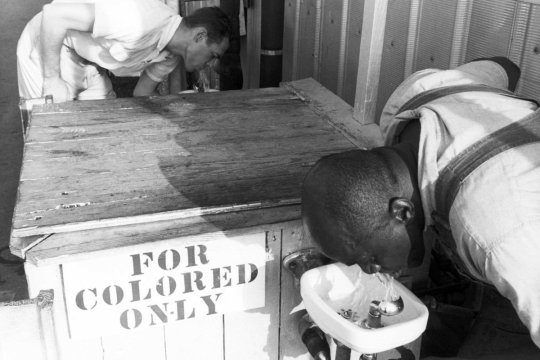
In this undated photo, two men use segregated drinking fountains in the American South. Getty Images
In the North, whites also rejected racial equality. After emancipation, they refused to make abandoned and confiscated land available to freedmen because they believed that African Americans would not work without white supervision. And when African Americans began fleeing Dixie during the Great Migration, white Northerners instituted their own brand of Jim Crow, segregating neighborhoods and refusing to hire black workers on a nondiscriminatory basis.
Slavery’s legacy is white supremacy. The ideology, which rationalized bondage for 250 years, has justified the discriminatory treatment of African Americans for the 150 years since the war ended. The belief that black people are less than white people has made segregated schools acceptable, mass incarceration possible, and police violence permissible.
This makes the myth that slavery had no lasting impact extremely consequential — denying the persistence and existence of white supremacy obscures the root causes of the problems that continue to plague African Americans. As a result, policymakers fixate on fixing black people instead of trying to undo the discriminatory systems and structures that have resulted in separate and unequal education, voter suppression, health disparities, and a wealth gap.
Something did “happen” 150 years ago: Slavery ended. But the institution’s influence on American racism and its continued impact on African Americans is still felt today.
Hasan Kwame Jeffries is an associate professor at Ohio State University.
4) The myth that history class taught us everything we needed to know about slavery
Many of us first learned about slavery in our middle or high school history classes, but some of us learned much earlier — in elementary school, through children’s books, or even Black History Month curriculum and programs. Unfortunately, we don’t always learn the entire story.
Most of us only learned partial truths about slavery in the United States. After the Civil War and Reconstruction, many in the North and South wanted to put an end to continuing tensions. But this wasn’t done just through the Compromise of 1877, when the federal government pulled the last troops out of the South; it was also done by suppressing the rights of black Americans and elevating the so-called “Lost Cause” of the enslavers.
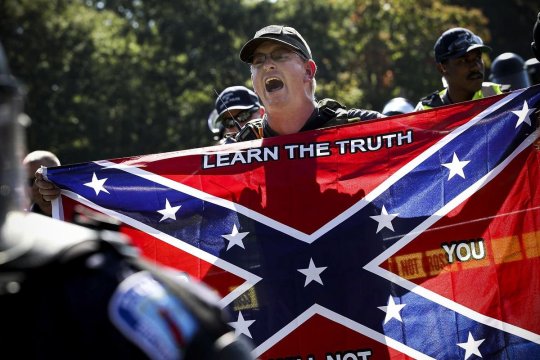
The Tennessee-based group “New Confederate State of America” held a protest in support of retaining a statue of Confederate Gen. Robert E. Lee located on Monument Avenue in Richmond, Virginia, September 16, 2017. Win McNamee/Getty Images
The Lost Cause is a distorted version of Civil War history. In the decades after the war, a number of Southern historians began to write that slaveholders were noble and had the right to secede from the Union when the North wished to interfere with their way of life. Due to efforts by a group of Southern socialites known as the United Daughters of the Confederacy, Lost Cause ideology influenced history textbooks as well as books for children and adults. The accomplishments of black Americans involved in the abolition movement, such as Frances Ellen Watkins Harper, Maria W. Stewart, Henry Highland Garnet, and William Still, were downplayed. Union generals like Ulysses S. Grant were denigrated, as were anti-racist whites from John Brown to William Lloyd Garrison. Generations later, there are still many people around the country who believe the Civil War was about states’ rights and that slaves who had good masters were treated well.
Even an accurate historical curriculum emphasizes progress, triumph, and optimism for the country as a whole, without taking into account how slavery continues to affect black Americans and influence present-day domestic policy from urban planning to health care. It does not emphasize that 12 of the first 18 presidents were enslavers, that enslaved Africans from particular cultures were prized for their skills from rice cultivation to metallurgy, and that enslaved people used every tool at their disposal to resist bondage and seek freedom. From slavery to Jim Crow to civil rights to the first black president, the black American story is forced into the story of the unassailable American dream — even when the truth is more complicated.
Given what we learn about slavery, when we learn it, and how, it is clear that everyone still has much more to learn. Teaching Tolerance and Teaching for Change are two organizations that have been wrestling with how we introduce this topic to our young. And what they’re learning is that the way forward is to unlearn.
Ebony Elizabeth Thomas is an associate professor at the University of Pennsylvania.
5) The myth that slavery doesn’t exist today
One of the greatest myths about slavery is that it ended. In fact, it evolved into its modern form: mass incarceration.
The United States has the highest prison population in the world. More than 2.2 million Americans are incarcerated; 4.5 million are on probation or parole. African Americans make up roughly 13 percent of the general population. But black men, women, and youth have outsize representation in the criminal justice system, where they make up 34 percent of the 6.8 million people who are under its control. Their labor is used to produce goods and services for businesses that profit from prison labor.

Prisoners at the Ferguson Unit, a large prison along the Trinity River in Texas, actively work the farm the prison runs, which includes planting and harvesting an annual cotton crop, 1997. The prison is located on a former cotton slave plantation. Andrew Lichtenstein/Corbis via Getty Images
For those of us who study the early history of mass incarceration in America, these statistics are not surprising. From the late 1860s through the 1920s, over 90 percent of the prison and jail populations of the South were black. Thousands of incarcerated men, women, and children were hired out by the state to private factories and farms for a fee. From sunup to sundown, they worked under the watchful eye of brutal “whipping bosses” who flogged, mauled, and murdered them. They earned nothing for their toil. Today, labor exploitation, the denial of human dignity and the right to citizenship, family separation, and violent punishment define our criminal justice system in ways that mirror slavery.
Hundreds of thousands of incarcerated people work. According to a 2017 report published by the Prison Policy Initiative, “the average of the minimum daily wages paid to incarcerated workers for non-industry prison jobs is now 86 cents.” Those assigned to work for state-owned businesses (correctional industries) earn between 33 cents and $1.41 per hour. In 2018, incarcerated Americans held a nationwide strike to end “prison slavery.” In a list of demands, striking individuals called for “all persons imprisoned in any place of detention under United States jurisdiction” to be “paid the prevailing wage in their state or territory for their labor.”
This is a year to remember slavery’s origins. It is also an opportunity to critique its legacies. Let’s not get so caught up in our efforts to commemorate slavery’s beginning that we fail to advocate for its end.
Talitha LeFlouria is the Lisa Smith Discovery Associate Professor at the University of Virginia.
Correction: An earlier version misstated the range of presidents who were enslavers. It was 12 of the first 18 presidents, not 12 of the first 16.
#5 Things People Still Get Wrong About Slavery#american racism#slavery of Black people in america#white supremacy#systemic racism#white lies about american enslavement of Black people#Black LIves Matter#White lies matter#white hate#homegrown terrorism#white lies#13th amendment#jim crow#jim crow laws#reconstruction#slavery exists in america today
2 notes
·
View notes
Text
being completely fr rn.. I dont really want to rewatch the anime if it weren't for everybody saying lizzy's character was ruined in it, which yeah it did some but uhhh
i never thought anime lizzy was that bad??? like yeah I saw the anime first, but even then. she just as silly as everybody else and not as awful and pointless as everyone makes her out to be? like theres a lot going on with her imo, more than whats credited to her
the whole cast was butchered frankly, but people still manage to analyze characters so idk why all of a sudden we cant for her :/ (in GOOD FAITH)
so yeah my goal this rewatch is to see if zz is really that bad (shes not) and what is going on with her, theme-wise and like
#because you can analyze and meta any character in story no matter how small#(esp if theyre a white male. cause thats where all the fandom effort lies usually)#kuroshitsuji#elizabeth midford#im gonna be obnoxious about this so fair warning but block me now#if you dont want that#like not OBNOXIOUS obnoxious but yknow#im gonna blow up the lizzy tag#kuro#b.txt
9 notes
·
View notes
Text
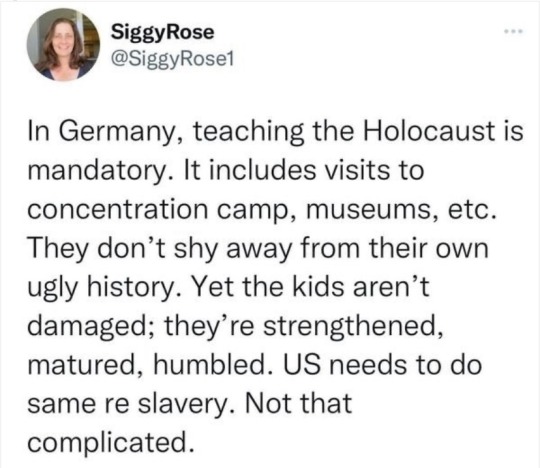
#woke is wonderful#this is why we can't have nice things#lies and the lying liars who tell them#teaching empathy#empathy#germany#german history#nazi germany#national history#awareness is power#awareness#history class#history#smash the patriarchy#empathy education#empowerment#history is repeating itself#history is awesome#black history#black lives matter#the invention of whiteness#white supremecy#racists#racisim#racial justice#racial history#civil rights#civil rights history
2 notes
·
View notes
Text
I am probably getting way too amused at the mounting stress of the lady who is using the dressing room stall next to the one where Nancy and Carol are trying on winter formal dresses. Carol's just real fucking mad about the pastel tyranny of the Misses Formals selection this year!!!
#tonight tonight the highway's bright#she also uses the word 'porking' to describe the sex act#and she interrogates nancy about why she's such a bummer all the time#this is nothing compared to the horror of the elderly couple who made the mistake of eating at the booth next to jonathan and lonnie at kfc#in the subsequent chapter#which isn't really funny so much as very upsetting#except that i keep thinking about this parody of hemingway's 'hills like white elephants'#where an annoyed person at the next table from the couple is just like. okay. i have to interrupt. that's not how an abortion works#nobody's discussing abortion at the kfc. to be clear#lonnie is telling lies about other practical matters that a seventeen-year-old who can barely focus on algebra 2 wouldn't know about#not his most impressive feat of hustlery and scammitude to be sure
2 notes
·
View notes
Text
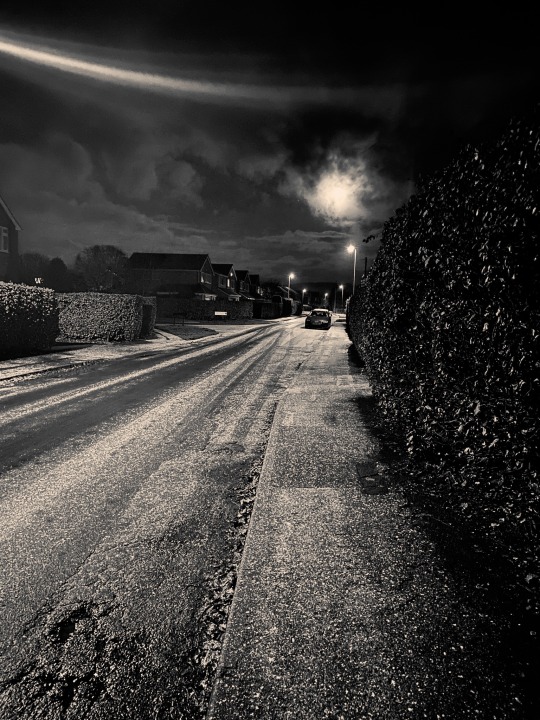
Whaling mind of the slain victim of hubris.
‘What have I done?’, the sorrowed one asked in his final release of breath.
No strength to voice a reply, he saw the truth in his mind. A life backed by lies.
Flower field of beauty, accept his sacrifice. Accept the depleted bloom from upon his root, and what followed to be his unbinding doom.
The village children, to whom were blessed by the ignorance that held them, stumbled upon thee. Screams of fear and confusion. Silence pierced them by the aggressor of existence.
They were stabbed by the likes of you, by you, for you.
Is that true?
Maybe there was no escape from your lost person. For what was killed this day was not just the mind of a person tempted by gold gardens, but an extended sentence to the prisoner held within.
Of course, this garden of Eden held more than mere quarrelsome minds. It is stained by victims of them. The white rose field covered in blood. A field of flowers frowned upon by faith.
- —— ——— ———- ———— ————- ———-
I know not what this means, nor whether I care to interpret it. I am tired.. In the future I will return to this and have a fit trying to make sense of the many metaphors festering within.
For now, we sleep alongside the warmth of a polar bear.

#blog#polar bears#literature#polar bear#motivation#change#love#thoughts#adventure#strength#rose#white lies#a matter of life and death#children#ignorance#bliss#metaphor#poems on tumblr#original poem#meaning#madness#descent into madness#chaos#what?#why#i am tired#for later#i wrote this whilst sat in bed dozing into a world between nightmare and dream#expressive writing#creative writing
3 notes
·
View notes
Text
finding the blogs of old mutuals is very fun sometimes but i think i just found one of my ex and they are like. straight up lying on main
#or they just lied to me. but somehow i doubt it lol#(as in. they say they're 20. they were supposedly in college when we dated... 5 years ago 🤨)#(also back then they said they're russian and i mean. they did look white -#- but now they claim to be indigenous and palestinian... um?)#(like. if it was just the white thing I'd say it's a matter of passing. whatever. -#- but combined with not mentioning it earlier and also lying about their age... yeah i have my doubts 😩)#(that being said the russian thing was also always suspicious bc in vc they never had an accent -#- despite supposedly moving only a few years beforehand. so who knows! maybe that one was the lie then!)#none of this actually matters. they can lie if they wanna it doesn't affect me or smth. just telling you to clear out my head 🫡#yknow there was also this time while we dated where they had just a huge personality switch#not for the bad or smth. just. a big switch out of nowhere. it was really weird#to the point it was one of the reasons i broke up with them. oops (alongside the aro thing + long distance being Not Fun)#lmao overall a very strange person i feel like i dodged some bullet there.
9 notes
·
View notes
